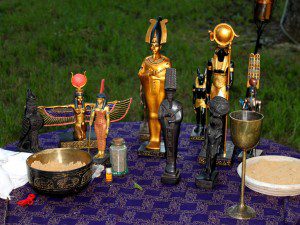 In a comment to my UU Sunday service on Worshipping Fearsome Gods, fellow Patheos Pagan blogger Asa West asked a complicated but very relevant question. I’m going to include her comment in its entirety.
In a comment to my UU Sunday service on Worshipping Fearsome Gods, fellow Patheos Pagan blogger Asa West asked a complicated but very relevant question. I’m going to include her comment in its entirety.
John, I was wondering if you could clarify this comment? In the OP, you write:
“What do you want from your religion? Are you looking for opium to dull your pain? Do you want a divine vending machine where you do the “right” things and blessings just appear?
Or do you want the inspiration to live virtuously and heroically, to do what’s right even when it’s not easy, and to leave the world a better place for those who come after us?”
Those questions seem to imply that avoiding fearsome gods is the equivalent of using religion as “opium” or a “vending machine.” However, here in the comment thread, you say that not some people aren’t well-suited to work with fearsome gods.
Do you mean that some people are doomed to use religion as an opiate because of their inherent disposition? If so, doesn’t that seem fatalistic? It seems to me that people who don’t seem well-suited might sometimes be the *best* candidates for working with fearsome gods, since they need to be tested and strengthened the most.
I might have misread you, though. I’d love to hear your thoughts!
There are multiple issues in Asa’s comment. And if one person is asking, it’s likely there are others who are wondering the same things. So rather than give a brief answer on the other post, I decided to explore the matter in more depth in its own post.
“Those questions seem to imply that avoiding fearsome gods is the equivalent of using religion as ‘opium’ or a ‘vending machine’.” There are many reasons why people avoid fearsome Gods. Perhaps they’re still too wounded and need to finish healing. Perhaps their calling is to work with more nurturing deities, or the nurturing side of complex deities. Remember this was a Sunday service in a UU church – perhaps their calling is to Buddhism or Christianity or some other non-Pagan path.
There are valid reasons for avoiding fearsome Gods. Looking for religious opium or for spiritual vending machines aren’t among them.
“However, here in the comment thread, you say that not some people aren’t well-suited to work with fearsome gods.” This is true. Different Gods call different people to worship and work with Them in different ways. I would be a poor match with a trickster God. You could say I’m too uptight and a trickster could teach me to relax, but why would Loki or Coyote or Eris do that, when there are plenty of people who would welcome Them into their lives?
They call who They call for Their own reasons, and sometimes those reasons aren’t clear to us. It would be the height of arrogance for me to tell someone that a particular deity couldn’t or wouldn’t call them, like some racists who believe their Gods only belong to those with certain skin tones. That doesn’t mean I won’t question those whose interpretations of a deity are at odds with established lore and the experiences of contemporary devotees, but that’s a different issue.
So the answer to this question is “yes, but not always.”
“Do you mean that some people are doomed to use religion as an opiate because of their inherent disposition? If so, doesn’t that seem fatalistic?” This question is getting close to the issue of fate vs. free will, and I always come down on the side of free will. At the same time, because some people’s unique combination of nature and nurture tends toward the manipulative and/or transactional side, they are “doomed” (i.e. – highly predisposed) to use religion as an opiate.
My goal is to encourage those who are in that danger zone to be aware of their situation, and to choose to accept the challenges of good religion where ever and when ever they can.
“It seems to me that people who don’t seem well-suited might sometimes be the *best* candidates for working with fearsome gods, since they need to be tested and strengthened the most.”
That assumes one of the fearsome Gods sees something in these people that attracts Their attention. As a devotional polytheist, I reject the idea that the Gods are here primarily for our growth and development. That is certainly one benefit of working with Them, and most deities have a compassionate side as well as a fearsome side. But in my experience, when the Gods begin a “reclamation project” it’s because They have something They want the person to do to support Their work.
A relationship between a human and a God can be initiated from either side. Sometimes a person who seems ill-suited to work with a fearsome deity might seek Them out. I encourage this, but I encourage people to do it wide awake. If you ask the Morrigan help strengthen you, don’t be surprised when one day She puts a spear in your hands and sends you to the front lines to put that new-found strength into use.
The mainstream culture in which we all live has some very unhelpful ideas about the primary purpose of religion. Some tell us the main purpose is to believe the right unprovable supernatural proposition. Others tell us the most important thing is to obey all their rules. Many, though, see religion either as a source of comfort (“God loves you and wants you to be happy”) or as a source of benefits (“if I do all the right things I’ll get what I want”). We see this promoted with things like The Secret and the pseudo-Christian Prosperity Gospel.
There is a place for religion that comforts, soothes, and heals. There is a place for religion that helps you deal with life’s difficulties, including obtaining the things you need to live a healthy life. As I said in the Sunday service,
If we are wounded we must heal, and that healing takes time – how much time varies widely from individual to individual. But a hospital is a place we go when we must – it is not a place to live our entire lives.
Too many people stay in the religious hospital long after they should be well and back to work at life.
The other side of religion is the hard work of making the world a better place, through practicing and promoting healthy religion, working for peace and justice in the wider world, and building a culture of sustainability. This isn’t easy, for many of the reasons I outlined in my last post. But it’s necessary, so those of us who see things as they are work in cooperation with our Gods, ancestors, and the spirits of Nature to make it so.
And we encourage others to join us in this great work.


















